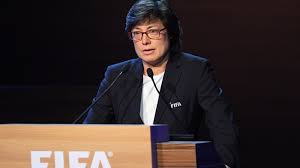May 3 – One of the most prominent figures in women’s football says it’s partly FIFA’s own fault that the Women’s World Cup is not attracting sufficient interest from Europe’s top broadcasters.
FIFA and its president Gianni Infantino have threatened a broadcast blackout of this summer’s tournament in Europe’s ‘Big 5’ TV markets because of “disappointing” rights offers.
But former FIFA Council member Moya Dodd claims FIFA is part of the problem, having been responsible for the tournament being historically undervalued.
Infantino has been complaining for months about what he claims are unacceptable bids from broadcasters from Britain, Spain, France, Germany and Italy who apparently have offered only $1 million-$10 million for the rights, compared to $100 million-$200 million for the men’s World Cup.
But Dodd, an ex-Australia international, blamed FIFA for in the past selling the rights for the Women’s World Cup as part of a package with the men’s.
“Now that FIFA has decided to sell the rights separately, it’s no surprise that the buyers don’t want to pay the same big numbers twice,” Dodd told the Sydney Morning Herald.
“Effectively, the industry was trained to pay big money for the men’s World Cup and treat the women’s equivalent as worthless. At the same time, the women were told they didn’t deserve prize money or equal pay because they didn’t bring the revenues.
“It’s actually quite outrageous. For FIFA to now say that all women’s revenues will go straight into women’s football overlooks the fact that the value of the women’s rights have until now been used to inflate the value of men’s football.”
The Women’s World Cup will be held from July 20-August 20 in Australia and New Zealand.
Rebecca Sowden, a former New Zealand international, agreed with Dodd that there were better ways for FIFA to behave instead of its “short-sighted” approach of issuing a blackout threat which she said would only be counter-productive.
“Not broadcasting the games in key European markets would be short-sighted and a massive blow to the wider women’s football ecosystem with fans and sponsors being the biggest losers,” Sowden said.
“Instead, FIFA should be working to better educate and demonstrate the value of women’s football, each and every year – as we see in the USA around women’s basketball and other sports – rather than popping out of the woodwork every four years when it’s time for media negotiations.”
In Europe, matches will be played in the middle of the night and Sowden added: “Of course broadcasters in Europe have every right to be wary about off-peak broadcast time zones … FIFA and media partners should work together to ensure interest will be there and can be monetised by broadcasters in a way that works for all parties.”
Contact the writer of this story at moc.l1714177068labto1714177068ofdlr1714177068owedi1714177068sni@w1714177068ahsra1714177068w.wer1714177068dna1714177068

